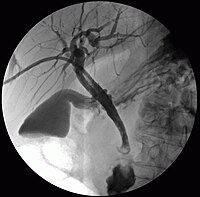
Photo from wikipedia
Abstract Background and objective Although pre-operative biliary drainage (PBD) is frequently performed in patients with cholangiocarcinoma (CCA), its impact on patient survival is unclear. Our aim was to evaluate the… Click to show full abstract
Abstract Background and objective Although pre-operative biliary drainage (PBD) is frequently performed in patients with cholangiocarcinoma (CCA), its impact on patient survival is unclear. Our aim was to evaluate the impact of PBD on overall survival of patients with extra-hepatic CCA. Methods This was a retrospective study using the Surveillance, Epidemiology, and End Results (SEER)-Medicare data. Patients who underwent biliary drainage within 3 months prior to and/or after diagnosis of CCA were included in the PBD cohort. Patients who did not receive biliary drainage were included in the non-PBD cohort. Cox proportional hazard regression was used to determine independent predictors of survival. Results Of 3862 patients with extra-hepatic CCA, 433 (11.2%) underwent curative surgical resection, with a median survival of 14 months (95% confidence interval [95% CI], 10–21 months) in the PBD cohort (n = 126) vs 31 months (95% CI, 26–39 months) in the non-PBD cohort (n = 307) (P < 0.001), during the median follow-up duration for the surgical cohort of 26 months (range, 1–60 months). Among the 433 patients, 126 (29.1%) underwent PBD and had significantly higher Charlson comorbidity index and advanced SEER stage than those without PBD before surgery. On multivariable analysis in patients who underwent curative surgical resection, after adjusting patient demographics, tumor characteristics, Charlson comorbidity index, radiotherapy and chemotherapy, PBD was significantly associated with shortened survival time (hazard ratio, 2.35; 95% CI, 1.34–4.10; P = 0.003). Conclusions PBD appears negative impact on long-term survival in patients with potentially resectable CCA and should be avoided if possible.
Journal Title: Gastroenterology Report
Year Published: 2019
Link to full text (if available)
Share on Social Media: Sign Up to like & get
recommendations!